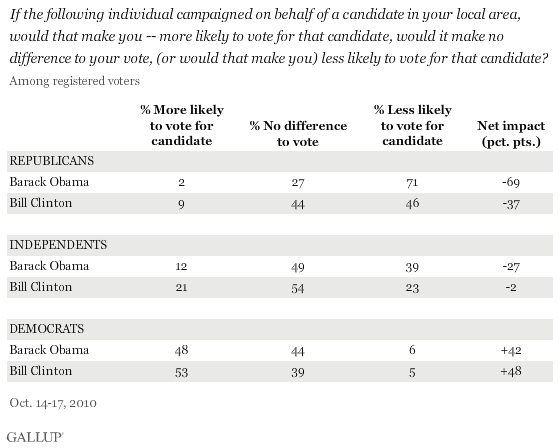PRINCETON, NJ -- Former President Bill Clinton has the potential to do more good for Democratic candidates on whose behalf he campaigns than does President Barack Obama. The net positive impact of Clinton's campaigning among Democratic registered voters is +48, while the number is a slightly lower +42 for Obama. Clinton, however, has a significantly more positive impact than Obama does among independents -- and among Republicans.

Voters were asked in Gallup's Oct. 14-17 poll to indicate whether Clinton's or Obama's campaigning in their area on behalf of a local candidate would be a plus, would be a minus, or would make no difference. The "net impact" score is based on subtracting the percentage who said such campaigning would make them less likely to vote for the candidate in question from the percentage who said it would make them more likely to vote for that candidate.
While Clinton does modestly better than Obama among Democrats, his net positive impact becomes comparatively larger compared with Obama's among independents and Republicans. This almost certainly reflects the fact that Clinton has been out of office for 10 years, and thus has become a more benign figure to those who are independent or who identify with the Republican Party. Obama, of course, is the current Democratic president, and thus more likely to generate strong feelings at this point in his career.
Among independents, Clinton's impact breaks about even, while Obama's is -27, a net negative, with 39% saying Obama would make them less likely to vote for a candidate and 12% saying he would make them more likely to do so.
Few Republicans say either of these Democratic politicians would make them more likely to vote for a candidate for whom the politician campaigned. But, while 71% say Obama would turn them in the opposite direction, 46% of Republicans say this about Bill Clinton.
Implications
President Obama, former President Clinton, and other high-visibility politicians are out on the campaign trail at this point in the election cycle primarily to increase enthusiasm and turnout among the faithful who are already inclined to vote for their party's candidate. Indeed, in Gallup polling, most Democrats say they would vote for the Democratic candidate. Thus, given that around half of Democrats say either Obama or Clinton would make them more likely to vote for a local candidate, there appears to be some value to their party in having the two campaign -- assuming the "more likely to vote" sentiment translates into motivation and enthusiasm about actually casting a ballot.
The data make it clear that Clinton is in a position to have at least a modestly more positive net impact on a House, Senate, or gubernatorial campaign than Obama. Clinton generates a slightly higher self-reported "more likely to vote" response among Democrats. He also generates a substantially more positive impact among independents and Republicans. Of course, few Republicans are going to vote for a Democratic candidate in any case. It is possible, however, that Obama's negative impact as recorded in these data could have the effect of increasing GOP voters' motivation to vote when Obama campaigns in a given district or state.
Learn more about Gallup's likely voter models for the 2010 midterm congressional elections.
Results for this Gallup poll are based on telephone interviews conducted Oct. 14-17, 2010, with a random sample of 935 registered voters, aged 18 and older, living in the continental U.S., selected using random-digit-dial sampling.
For results based on the total sample of national adults, one can say with 95% confidence that the maximum margin of sampling error is ±4 percentage points.
Interviews are conducted with respondents on landline telephones (for respondents with a landline telephone) and cellular phones (for respondents who are cell phone-only). Each sample includes a minimum quota of 150 cell phone-only respondents and 850 landline respondents, with additional minimum quotas among landline respondents for gender within region. Landline respondents are chosen at random within each household on the basis of which member had the most recent birthday.
Samples are weighted by gender, age, race, education, region, and phone lines. Demographic weighting targets are based on the March 2009 Current Population Survey figures for the aged 18 and older non-institutionalized population living in continental U.S. telephone households. All reported margins of sampling error include the computed design effects for weighting and sample design.
In addition to sampling error, question wording and practical difficulties in conducting surveys can introduce error or bias into the findings of public opinion polls.
View methodology, full question results, and trend data.
For more details on Gallup's polling methodology, visit https://www.gallup.com/.
